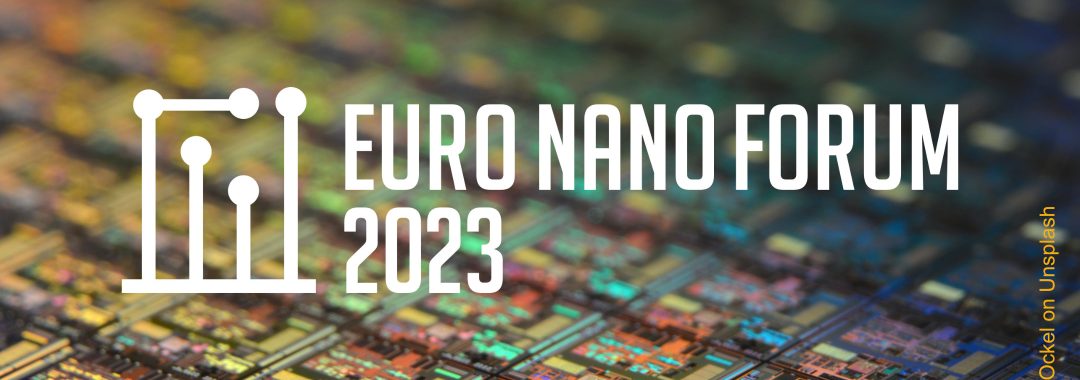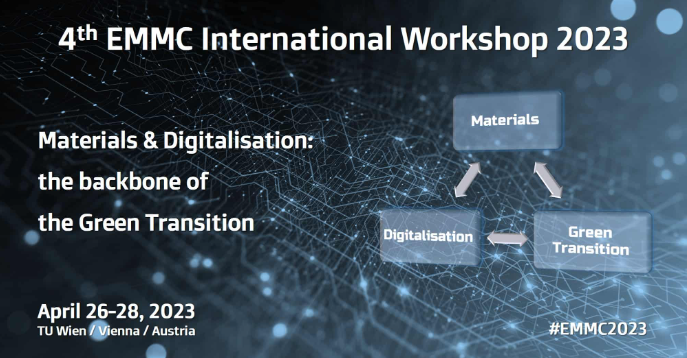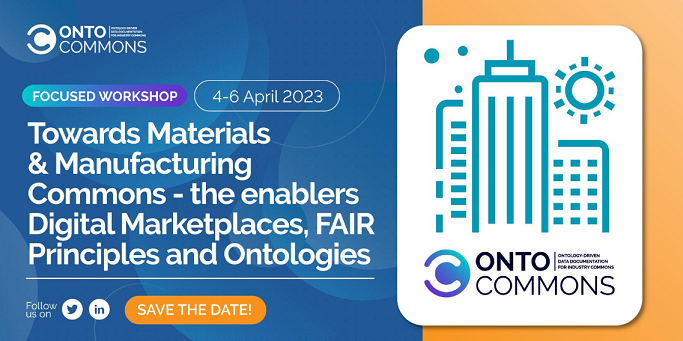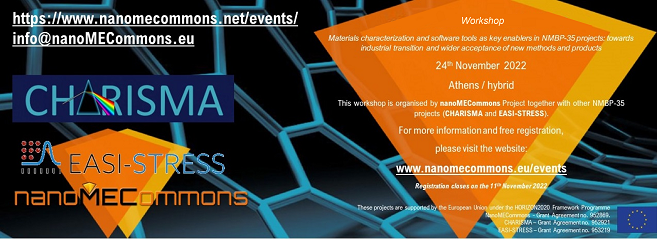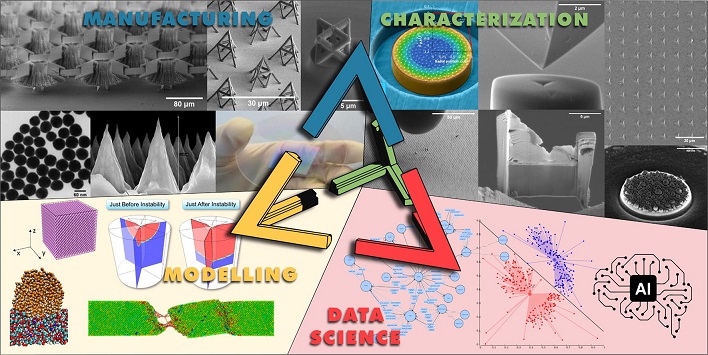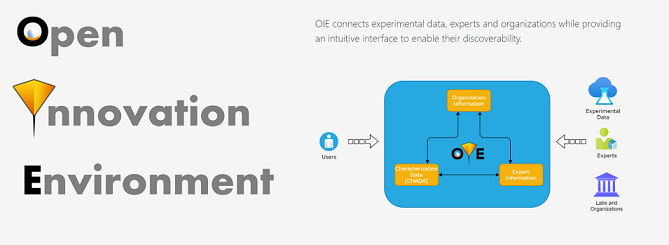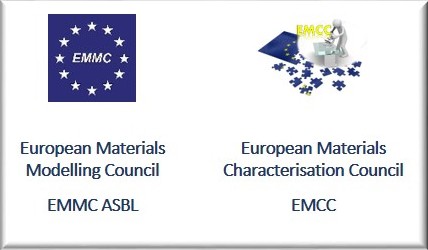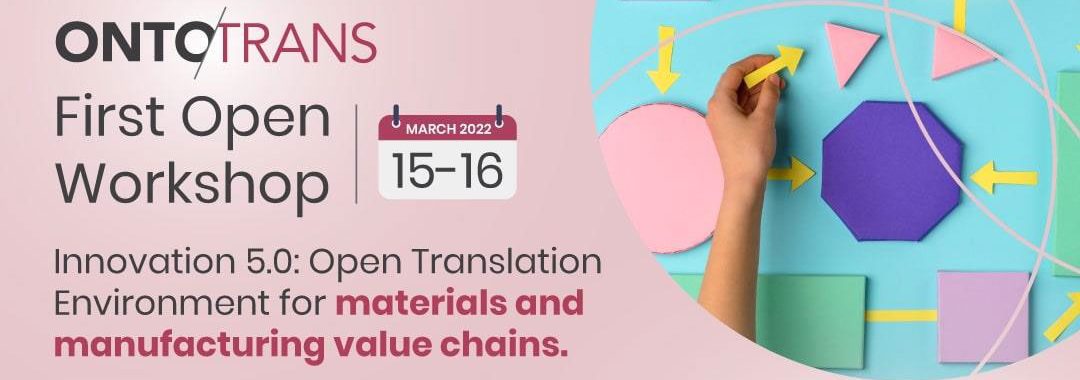Update on EuroNanoForum 2023 and EMCC Session
We’d like to invite you to view the first version of EuroNanoForum agenda which is now available. EuroNanoForum is spread out over 3 days, and each day has something different to offer, from pitch presentations to high level debates, and hot topics from the various challenges in the materials field. Make sure you register and don’t miss out on the opportunity to connect with experts and other like-minded professionals.
Registrations are now open. Please follow the link below to register (both online or in person participation):
EuroNanoForum Registration Page.
Hopefully, we’ll get the chance to meet you and exchange insightful views during EMCC session on Day 3 or in the exhibition.
Save the date! June 13, 2023: EMCC Session in EuroNanoForum – Advanced materials characterisation: Digitalisation and Materials Innovation Markets on the spot
Description:
Digitalisation opens opportunities for European SMEs in niche high-tech markets and for strengthening the competitiveness of large global players in Europe. The Advanced Materials 2030 Initiative (AMI2030) has identified the key role of advanced materials in the green and digital transition and highlighted the need to combine materials and digital competences in materials industries as key challenge of the European materials industry.
As a complement and support to this initiative, the European Materials Characterisation Council (EMCC) aims at addressing these challenges by bringing together key players in European industry and policymakers. The proposed EMCC session, endorsed by the European Commission, will showcase the strategic role of characterisation in the broader framework of AMI2030 in driving innovation and promoting the best use of materials in industry and society, with a particular attention to digitalisation.
The European Materials Modelling Council (EMMC), which is leading Digitalisation WG1 in AMI2030, also plans support this event, highlighting the intertwining of materials characterisation and modelling and the key role of model-based design in driving digital innovation. The EMCC session will include plenary talks, as well as provide a platform for roundtable discussions and roadmapping, enabling participants to map out the challenges and opportunities facing in industry. Digitalisation (in the sense of the coherent, integrated digital and model-based representation of materials, processes and products) is a key enabler for advanced materials development in the twin transition. Digital monitoring is expected to increase Industrial Resilience to external pressure in the supply chain and new regulations that arise form Governance Bodies, due to the optimized use of resources and data-driven and rapid adaptivity of manufacturing to the new challenges in a new digital and sustainability framework.
EuroNanoForum 2023 Session – Organised by European Materials Characterisation Council (EMCC)
Day 3 of EuroNanoForum – Tuesday 13th June 2023
EMCC session in the main ENF2023 programme: 10.30 – 12.30
Session Structure:
Part 1: Plenary and keynotes by industry & industrial initiatives (interactive session with audience):
- Links to ongoing Roadmaps and Materials 2030 Roadmap, EMMC and AMI2030 WG1 on Digitalisation
Part 2: EMCC Roadmap
- Roundtable and Open Discussion on initiation of EMCC Roadmapping activities
Organisation committee – EMCC Board members
- Costas Charitidis (NTUA, Greece)
- Elias Koumoulos (IRES, Belgium)
- Bojan Boskovic (CΝΤ, UK)
- Spyros Diplas (SINTEF, Norway)
- Gerhard Goldbeck (EMMC Executive Secretary, Belgium)
- Ennio Capria (ESRF, France)
- Marco Sebastiani (University “Roma Tre”, Italy)

EMMC2023 – Registration is open! / APR 26-28, 2023 / TU Wien – Vienna – Austria
#EMMC2023 – The 4th EMMC International Workshop finally provides the opportunity of networking with European and International experts on site again!
Following events in 2017, 2019 (in Vienna) and 2021 (online), the 4th EMMC International Workshop returns as a physical event in Vienna in 2023 in its successful format combining high level plenaries with discussion sessions led by Impulse Talks. EMMC 2023 supports the importance of networking in physical events, EMMC 2023 by including 30 minute breaks between sessions as well as a poster session, a European Projects market, a joint ‘science walk’ through the centre of Vienna and an opportunity to socialise at Heurigen.
For more information, please visit EMMC.
Towards Materials and Manufacturing Commons – the enablers Digital Marketplaces, FAIR Principles and Ontologies
OntoCommons is organising this workshop aiming at tackling various challenges identified within the Materials and Manufacturing domains. The event will be spread out over 3 days, and each day will focus on a different theme. Day 1 focuses on ontologies, data documentation, data spaces and interoperability. Part 2 of the workshop will focus on FAIR principles, and the final day of the workshop will give the opportunity to participants to express their thoughts, provide feedback and input in relation to the OntoCommons digital ecosystems and tools.
More information about the workshop (including the agenda) you can find it here.
Registration is available here.
2ND CO-CREATION WORKSHOP
NMBP-35 Horizon 2020 Projects NanoMECommons, Charisma, and Easi-stress will co-host a hybrid Workshop event and would like to invite you to join in person!
Workshop Title
Materials characterization and software tools as key enablers in NMBP-35 projects: Towards industrial transition and wider acceptance of new methods and products
Date and Location
The workshop will be held on Thursday the 24th November 2022, as a hybrid event (Athens/online), and is supported by European Materials Characterisation Council (EMCC).
Thematic Areas
The outcomes of the workshop will be used for an Open Consultation Process, by identifying the community needs in accordance with EC directives and EMCC objectives in three key thematic areas:
- Characterization/
Standardization - Suites of multi-scale/AI modelling and characterization
- Materials 2030 Roadmap: Characterization and modelling as horizontal enablers
Registration and Agenda
Registration Deadline: 11th November 2022
Agenda: Please find further Information via our websites.
Cost: Free, but registration is required!
EMCC Contact
Join us in EMCC fostering collaboration.
For further questions about the workshop, please contact us at emcc@characterisation.eu
New article in materials & design
There is a new article available co-authored by Charitidis, Sebastiani and Goldbeck (2022) focusing on innovation in materials manufacturing for Industry 5.0. The article is available online with Materials & Design in Volume 223.
Abstract:
Recent advances in materials modelling, characterization and materials informatics suggest that deep integration of such methods can be a crucial aspect of the Industry 5.0 revolution, where the fourth industrial revolution paradigms are combined with the concepts of transition to a sustainable, human-centric and resilient industry. We pose a specific deep integration challenge beyond the ordinary multidisciplinary modelling/characterization research approach in this short communication with research and innovation as drivers for scientific excellence. Full integration can be achieved by developing common ontologies across different domains, enabling meaningful computational and experimental data integration and interoperability. On this basis, fine-tuning of adaptive materials modelling/characterization protocols can be achieved and facilitate computational and experimental efforts. Such interoperable and meaningful data combined with advanced data science tools (including machine learning and artificial intelligence) become a powerful asset for materials scientists to extract complex information from the large amount of data generated by last generation characterization techniques. To achieve this ambitious goal, significant collaborative actions are needed to develop common, usable, and sharable digital tools that allow for effective and efficient twinning of data and workflows across the different materials modelling and characterization domains.
Keywords: Industry 5.0; Ontology; Modelling; Materials characterization; Data interoperability
Licence: The article is accessible via Science Direct and with a Creative Commons (CC BY-NC-ND) licence, which means it is open access for everyone to read.
Citation: Charitidis, C., Sebastiani, M., & Goldbeck, G. (2022). Fostering research and innovation in materials manufacturing for Industry 5.0: the key role of domain intertwining between materials characterization, modelling and data science. Materials & Design, 111229. Available at: https://doi.org/10.1016/j.matdes.2022.111229
Image: Available via the citation.
OYSTER Open Innovation Platform
The final version of OYSTER Open Innovation Environment (OIE) is online – this platform can be used as a model for other EMCC/related projects to develop and implement other platforms.
For more information about OIE, please visit https://oyster-oie.eu .
If you have any other questions, email us at emcc@characterisation.eu
CHARISMA Raman Training School
CHARISMA Raman Training School
18 – 19 October 2022, Turin, Italy
You are invited to CHARISMA Raman School 2022, organised by the EU-funded Horizon 2020 CHARISMA project.
The school will take place on 18-19 October 2022 in Turin, Italy, as the preceding satellite event of this year’s VAMAS (The Versailles Project on Advanced Materials and Standards) Steering Committee Meeting.
Raman Training School will be hosted by INRiM (Istituto Nazionale di Ricerca Metrologica) in their facilities.
The school will provide extensive training in Raman spectroscopy and focus on various contemporary topics in the Raman-related fields, such as data harmonisation and analysis, new techniques and devices, or relevant and emerging applications.

The European Materials Modelling Council (EMMC ASBL) together with the European Materials Characterisation Council have laid out the case for digital integration of horizontal enablers for materials ecosystems
Introduction
The digital transformation of technologies and services provides the basis of the Industry 5.0, which complements the existing Industry 4.0 paradigm by highlighting research and innovation as drivers for a transition to a sustainable, human-centric and resilient industry.
The materials and manufacturing industry is becoming more and more reliant upon a digital ecosystem in which stakeholders are connected, comprising aspects such as data and knowledge, technologies, human resources, applications, and operations. Digital market-places are being built that connect manufacturers, suppliers, distributors, and their consumers so that they can share resources to create what are essentially virtual organisations. Today, digital industry ecosystems are evolving rapidly, driven by powerful economic forces, and they will have a lasting impact on how manufacturers interact with materials suppliers and their customers.
Materials discovery and life cycle management requires the involvement of skills and capabilities from many disparate communities ranging from chemistry, materials science, physics, engineering, information technologies and data science. Key advanced technologies and tools from these fields include materials synthesis, robotics, characterisation and modelling, ML/AI and ontologies. A Common Digital Ecosystem needs to warrant interoperability between all such “horizontal enabler” technologies and to capitalise on commonalities between them. Their integration will be a cornerstone in the digital transformation of the manufacturing industry.
Improving resilience and sustainability as well as ensuring safety of materials in all products throughout the life cycle requires a wide and complex range of trusted information on materials and process behaviour, along the entire lifecycle of the product and its associated material, reaching far beyond the quality and quantity of data sets currently available to industry.
Recent advances in “horizontal enabler” technologies including materials simulation, characterisation and materials informatics demonstrates that digital integration would enable closed-loop research that can design, perform and interpret simulations and experiments in an ecosystem of companies collaborating cross-borders.
In this short communication, we address the challenge to go beyond the ordinary multidisciplinary research approach. We envisage a common, digitally integrated materials ecosystem incorporating ontologies for different materials technologies and domains providing full interoperability. Such a system will enable companies to collaborate on more intelligent materials analysis, use and re-use of data, supported by advanced data science tools (including machine learning and artificial intelligence).
Such an industrial ecosystem will support materials and product manufacturing companies, in meeting their strategic objectives regarding resilience and sustainability, leading to more targeted design and development of safe and sustainable materials and processes, faster upscaling and effective quality control.
The European Materials Modelling and Characterisation Councils (EMMC[1] and EMCC[2]) are associations with a broad network of industrial stakeholders, focussing on horizontal enablers and who together address the cross-domain issues that arise during the ongoing digital industrial revolution and with this document we put forward our views for the future.
The document further informs on
- State of the Art of Materials Development Integration
- Drivers to digitally transform the Materials Ecosystem
- Activities proposed to create and support a Materials Ecosystem
- Expected Benefits of a Materials Ecosystem
ONTOTRANS First Open Workshop – March 15-16, 2022.
Dear colleagues,
we invite you to join the Horizon 2020 Project OntoTrans for its first virtual Open Workshop
Innovation 5.0: Open Translation Environment for materials and manufacturing value chains
on Tuesday, March 15 and Wednesday, March 16, 2022
In our workshop we provide information on
- how to represent manufacturing process challenges in a standard ontological form
- how to connect challenges with relevant information sources and materials modelling solutions
- how OntoTrans and its Open Innovation Framework function and how it
- develops from blue print to real life
Participate in our three sessions (Project, Collaboration and Demonstration) and join us in fostering collaboration and support to build an interconnected ecosystem for industrial impact together with our related project partners CHARISMA, DOME 4.0, EASI-STRESS, MarketPlace, MUSICODE, NanoMECommons, OntoCommons, OpenModel, OYSTER, VIMMP and VIPCOAT.
Registration and further Information on https://ontotrans.eu/ontotrans-1st-open-workshop/
We are looking forward to your participation and lively discussions!
Best regards,
the OntoTrans Consortium
